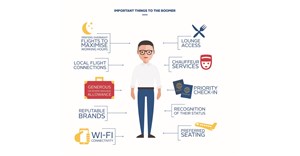Subscribe & Follow
#CannesLions
- The new standardCarl Willoughby
- All the South African winnersDanette Breitenbach
Trending
-

-

-

-

-
 Sibanye 'isn't short on money', but may shutter metal streamingClara Denina and Felix Njini
Sibanye 'isn't short on money', but may shutter metal streamingClara Denina and Felix Njini -
 #YouthMonth: Yoshin Leonard - Young people's voice is a rightDanette Breitenbach
#YouthMonth: Yoshin Leonard - Young people's voice is a rightDanette Breitenbach
Jobs
- Social Media Content Creator Johannesburg
- Senior Transfer Secretary Cape Town
- Pickers and Packers Durban
- Sales Consultant Bushbuckridge
- Retail Sales Agent Nelspruit
- Independent Sales Agent Hazyview
- Drivers and Truck Assistant Durban
- In-store Sales Representative Mbombela
- Forklift Driver Durban
- Warehouse Assistant Durban
Generation Y - working with Millennials

Generation Y's world is fast-paced and changing at speeds not yet seen before, due to the technology revolution. Many Gen Y-ers grew up with technology and are online and connected 24 hours a day. They do not want to miss out on anything and are consuming information constantly. As a result, Gen Y has evolved into 'multichannellers' - text messaging while driving, and listening to the GPS and their plugged-in iPod simultaneously.
They rely on technology to work more efficiently and prefer to communicate over social media and SMS rather than face-to-face. The 2012 Cisco Connected World Technology Report found that 40% socialise online with friends rather than socialise in person.
This is a generation defined by contradictions. It is the most educated, culturally diverse, wealthy, optimistic and tech-savvy of all the generations so far, but many of them are also unemployed, disappointed and self-centred, with a tendency towards instant gratification and entitlement.
Gen Y on the job
Gen Y faces challenges in the workplace that are unique to their generation. The economic downturn has impacted on the job market, making it unpredictable. Youth unemployment is increasing. Recent global research by the American Psychological Association found that this generation is stressed about unemployment, money, relationships and job stability. They are dealing with huge pressures due to the increasing demands of their work and personal lives. This sector of the population also has more choice than their parents ever had, from educational choices to work opportunities and even freedom of choice of their sexual orientation. All these options are confusing and stressful; there is immense stress around having to live with the consequences of their decisions.
"But in the workplace Gen Y is confident, sometimes overly so," says Matentji. "They like to be challenged, want to have their ideas and opinions heard and won't hesitate to question authority.
"Gen Yers also require constant and almost immediate feedback about their performance; it's important to them to know they are on the right track."
This need for instant feedback can be understood when one considers Gen Y in the context of social media and mobile communication. They have learnt to expect a fast response to their SMSes, to having something they posted on Facebook being 'liked' and to be able to stay abreast of news almost as it happens on Twitter. Gen Y cannot wait for yearly work appraisals.
Many of this generation have a 'work to live' rather than a 'live to work' attitude and do not feel the need to pay their dues in their careers like their parents did. If they are bored or offered more money they will make the move without hesitation. Researchers have found that Gen Y sees their jobs as temporary; 55% regard their jobs as merely career stepping stones. This has resulted in Gen Y developing a reputation of job-hopping, lacking company loyalty and constantly chasing the next big salary package.
"This situation has also been created because they are in demand for their skills and for being tech-savvy and they know it," says Matentji. "In my experience there are many young people who are qualified on paper and are being paid huge packages, but unfortunately it's a case of too much too soon and it's all about the money. Job experience and true depth isn't there because they don't do the time. But they are still being employed, because companies need the skills that these candidates have on paper."
Futurists predict that Gen Y will have 10 different careers in their lives, while many will juggle several jobs at the same time.
Mistakes parents made
Gen Y's parents were more enlightened about parenting and the psychological impact of poor or absent parenting. However, due to their intense involvement in their children's lives, they have been dubbed 'helicopter parents' - always hovering, fixing their children's mistakes and over-parenting them. As a result Gen Y is the most over-protected generation in history.
Gen Y parents wanted childhood to be a positive experience and once their children went to school they tended to de-emphasise coming first in class, at sports etcetera; making an effort was good enough. They also told their children they can do anything.
In a September 2012 a Time magazine article entitled: 'Note to Gen Y Workers: Performance on the Job Actually Matters', the authors explain how the way in which Gen Y was treated by parents and teachers has impacted on their attitude in the workplace. These children were praised and given awards just for showing up and this has now morphed into a sense of entitlement and unrealistic expectations at work.
"As a matter of fact, 40% of Gen Y respondents in one survey said they felt like they should be promoted every two years, regardless of achievements or work habits. What's even more shocking is that only nine percent believed they should receive promotions when it was warranted by their performance," says the article.
How to attract and manage the Gen Y employee
Gen Y has many qualities that are valuable in the workplace: their optimism, open-mindedness, confidence, energy and fearless approach to technology can have a positive impact in terms of motivating and inspiring colleagues. According to the 2012 Cisco Connected World Technology Report this generation is "more agile, more informed and more responsive than any previous generation. They live to connect and communicate" and this is of great value to employers.
Gen Y works hard if their work is relevant to them or if they have to learn about something they know nothing about. They just need a particular approach to encourage job satisfaction and company loyalty. Matentji offers the following tips on how to attract, manage and retain Gen Y:
- Recognise good performance and offer constructive criticism:
Offer praise for a job well done or let them know how they can improve and strengthen their skills. Gen Y need to be shown the path to success i.e. what they need to do to get promoted, how they can acquire the necessary skills. Because they were indulged by their parents they need this kind of guidance from their managers and would benefit from mentoring and coaching. - Flexibility:
Gen Y-ers are increasingly more demanding about workplace flexibility when it comes to work hours, the choice of technology and access to social media networks during the work day. A recent study called Millennials and the Future of Work has shown that Gen Y is seeking out jobs that are flexible and allow for independence instead of traditional nine-to-five corporate jobs. Those stuck in nine-to-five jobs said their reason for wanting to resign was because they wanted "freedom in the workplace". As an employer, the work environment has to allow Gen Y to work within flexible hours. As long as the work gets done every day, there should be no rigid start and end time, no micro-managing. - Work-life balance:
Gen Y has the desire to make a strong contribution to their company while still having a work/life balance. Many Gen Y-ers are not willing to shape their lives around work demands. They want a full life that includes ample time for friends, family and outside interests. An employer needs to recognise that these are well-rounded individuals who are not prepared to sacrifice their private life for work as many of their parents did. Gen Y will thrive in a work environment that supports their personal development, as well as their skills development. - Gen Y demands career fulfilment:Gen Y feels that a job they are not passionate about and that is not creative is not worth their time. They do not want to be just a number in the company; they want to make a difference and be recognised. An employer needs to convince Gen Y that they will be allowed to express their creativity. Career paths need to be clear but flexible and communicated to Gen Y. Individuality should be encouraged.
For more information, go to www.searchspecifics.co.za.
1 Generation Y dates differ from country to country.













